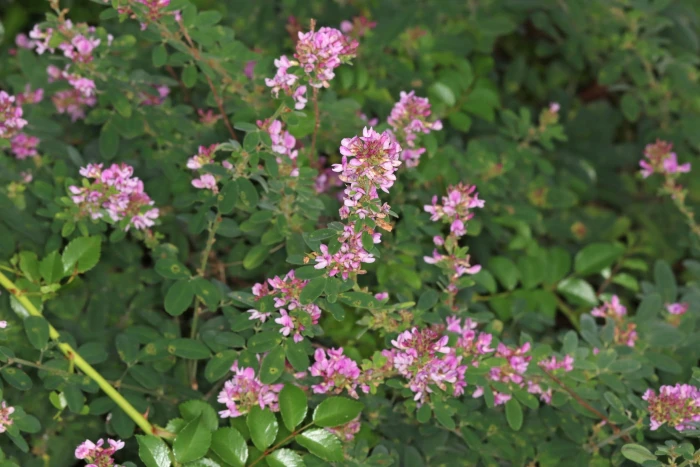Stueve’s Lespedeza
(Lespedeza stuevei)
Stueve’s Lespedeza (Lespedeza stuevei)
/
/

© Jake McCumber
CC BY-SA 4.0
Image By:
© Jake McCumber
Recorded By:
Copyright:
CC BY-SA 4.0
Copyright Notice:
Photo by: © Jake McCumber | License Type: CC BY-SA 4.0 | License URL: http://creativecommons.org/licenses/by-sa/4.0/ | Uploader: jakemccumber | Publisher: iNaturalist |























Estimated Native Range
Climate Requirements
| • Precipitation | 15" - 66" |
| • High Temp. | 74°F - 98°F |
| • Low Temp. | 9°F - 57°F |
Summary
Lespedeza stuevei, commonly known as Stueve’s Lespedeza, Tall Bush Clover, or Tall Lespedeza, is a deciduous perennial herb. It is native to Eastern and Central North America, typically found in prairies, open woodlands, and along railroads. This species thrives in a variety of habitats, including disturbed sites and grasslands, where it contributes to the ecosystem by providing food for pollinators and wildlife. It can reach a height of 5-7 feet (1.5-2.1 meters) and a width of 4-6 feet (1.2-1.8 meters), with a bushy, upright growth habit. The plant features compound leaves and dense clusters of small, pink to purple flowers that bloom in late summer, offering a late-season nectar source for bees and butterflies.
Stueve’s Lespedeza is valued for its ornamental qualities, including its showy flowers and ability to attract wildlife. It is used in naturalized plantings, prairie restorations, and as a border plant in large gardens. This species is relatively low-maintenance, tolerating drought once established and adapting to a range of soil types, though it prefers medium draining clay, loam, or sandy soils. It requires full sun to part shade to flourish and benefits from occasional pruning to maintain its shape and promote denser foliage. While generally disease-resistant, it can be susceptible to leaf spot and stem rot in overly moist conditions. Gardeners should be aware that in some areas, Lespedeza species can become weedy or invasive, so monitoring and management may be necessary to prevent unwanted spread.CC BY-SA 4.0
Stueve’s Lespedeza is valued for its ornamental qualities, including its showy flowers and ability to attract wildlife. It is used in naturalized plantings, prairie restorations, and as a border plant in large gardens. This species is relatively low-maintenance, tolerating drought once established and adapting to a range of soil types, though it prefers medium draining clay, loam, or sandy soils. It requires full sun to part shade to flourish and benefits from occasional pruning to maintain its shape and promote denser foliage. While generally disease-resistant, it can be susceptible to leaf spot and stem rot in overly moist conditions. Gardeners should be aware that in some areas, Lespedeza species can become weedy or invasive, so monitoring and management may be necessary to prevent unwanted spread.CC BY-SA 4.0
Plant Description
- Plant Type: Herb, Shrub
- Height: 5-7 feet
- Width: 4-6 feet
- Growth Rate: Moderate
- Flower Color: Pink, Purple
- Flowering Season: Summer, Fall
- Leaf Retention: Deciduous
Growth Requirements
- Sun: Full Sun, Part Shade
- Water: Medium
- Drainage: Medium
Common Uses
Bird Garden, Border Plant, Butterfly Garden, Deer Resistant, Drought Tolerant, Erosion Control, Low Maintenance
Natural Habitat
Native to prairies, open woodlands, disturbed sites, and grasslands in Eastern and Central North America
Other Names
Common Names: Tall Bush Clover, Velvet Lespedeza, Tall Lespedeza
Scientific Names: Lespedeza stuevei, Lespedeza stuevei f. angustifolia, Lespedeza stuevei var. angustifolia, Lespedeza stuevei var. stuevei, Lespedeza virgata, Lespedeza virgata
GBIF Accepted Name: Lespedeza stuevei